|

Learn your LINES !
Ruwini JAYAWARDANA
For more than four decades now, Ravindra Randeniya has been
considered as one of Sinhala cinema’s most iconic thespians. Proving his
mettle equally well in theatre and the screen he is among a few actors
who had constantly delivered a performance in a range of different
roles.
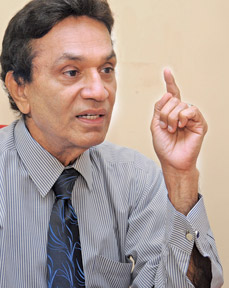
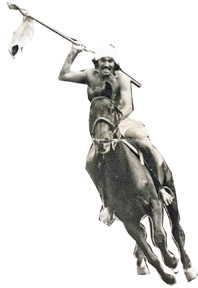 |
|
Veera Puran
Appu |
“The best role I have portrayed is Jayanath in Dadayama. According to
my perception, it is the worst villain role in Sri Lankan cinema
history. When I was offered the role, director Vasantha Obeysekara
warned me about the nature of the character.
“He warned me that people will hate me for the role that I will
portray but at the same time assured me that he wants someone who will
not play the standard villain's character and destroy the suspense in
the film. He requested me to take on this role for the sake of cinema,”
noted our ‘Encounter of the Week’.
The award winning actor is also the Presidential Advisor for
development of cinema and heads The Film Team (Private) Limited, a film
production company which had handled groundbreaking projects like Deepa
Mehta’s Midnight’s Children, Berengar Pfahl’s The Emden Men, Arne
Birkenstock’s Chandani: The Elephant Whisperer and Otto W Retzer's Dream
Hotel Sri Lanka and Dream Hotel Maldives.
Q: Out of all your achievements, what would you say defines
you most?
A: From all the activities that I have done in the last four
decades, the acceptance I have achieved from the public is my biggest
achievement. People accept you as an individual, member of the Sri
Lankan society and the film fraternity. They appreciate you for whom and
what you are.
Q: How did Dhamma Jagoda's influence change your acting
career?
A: 100 percent. A lot of people tend to think that there is no
science or principles involved in acting. It is a subject to be studied.
Acting is a much deeper art than that. If you take the basic concept,
you are recreating another character and becoming another person
altogether. Sometimes even the physical appearance is changed but the
way one character is different from the other is more than the
superficial look. It is the inner change that is important. To achieve
that and realize that one has to know what acting really is.
Acting involves many basic principles. It is the inner change that is
important. To realize that one has to know what acting really is. Acting
is a form of art but it is based on a lot of scientific principles
because psychology is so greatly involved in it. Physical readiness is
important for an actor to function.
 |
|
Aradhana |
The transition from one personality to another demands a lot of
knowledge.
A lot of people ask to what school did Joe Abeywickrama go and to
what school did Denawaka Hamine go. There is one in a million born with
enormous talent. Just because Abeywickrma did not go to an acting school
and did perform well, that does not mean that everybody else can do it
the same way.
If you are thinking of a career in acting, you have to learn about
acting. How you express yourself without having to speak a word. It
needs understanding, training, commitment, dedication and also a wide
outlook on the world and why people behave in certain manners. It covers
a huge sphere which is why I call it a very deep form of art. It is not
just reciting lines and move according to the requirements of the
camera.
Q: You were one of the few actors who did not stick to
stereotyped roles.
A: For me acting was not a vehicle to create an image for
myself. Some people are reluctant to do a villainous role because they
believe that the audience would see them as a villain. We have this
false notion that if you are a hero in films, you are a hero in real
life.
I willfully attempted to take on diverse characters and it has given
good results. It was mainly due to my theatre training. I trained in an
acting school for two and a half years. Then later I continued with the
school after getting my diploma by joining the teaching staff there. I
was in this process of learning for nearly five years. That training
made me understand that acting is not creating a way for yourself. The
actor's role is to perform not on the quality or the substance of the
character.
You cannot say that you are made only for television, cinema or
theatre because it is acting which is involved in all these three
spheres. I realized that selecting different roles were beneficial for
me on the long run rather than gaining the acceptance of the immediate
audience.
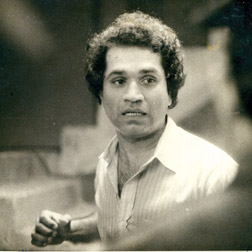 |
|
Janelaya |
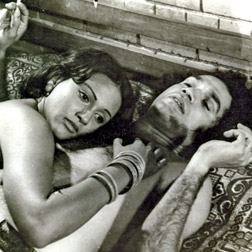 |
|
Siripala
Saha Ranmenika |
I played the role of a villainous hermit in Desa Nisa. Later I went
on to portray different kinds of roles in films like Siripala and
Ranmenika where the hero was an antihero. I was very keen on doing these
kinds of complex characters where so many facets of a character could be
brought out.
I am not Jayanath in Dadayama or the great Veera Puran Appu who
fought against the British or the innocent lover in Aradhana. That is
why I say acting is for you to bring out the best qualities in a
character rather than thinking about yourself, believing that it would
harm your image, and not serving the industry. If you have the capacity
and given the opportunity to do it and if that combination opens the
window for a great artistic work to be donated to Sri Lankan cinema,
then why don't you do it rather than be selfish?
I did the entire character in Janelaya without speaking a word! The
director had a certain reservation. He said that if the audience thinks
this man is not talking because they think he is dumb, then the value of
the character is lost. He suggested having one scene where I would say
‘hello’ to Salinda using my own voice. We filmed it but we did not use
it because once we edited the film the director said that it is obvious
that the character can speak but is not talking. So we omitted that
scene from the film.
Q: Fifty percent of the money earned by a film goes to the
theatre owners. In this, light most of the directors of movies which are
even box-office hits are unable to retain the money they put into the
productions let alone earn profit from the production. This has become a
serious issue and discourages producers in putting their bucks into
movie-making.
A: This is a grave injustice that we are addressing very
strongly for the past three years. Aba made over 200 million but
producer Justin Belagamage had not made any profit. This situation
resulted after the film distribution was privatized. Before that the
National Film Corporation had a perfect system where the films were
distributed by the institution and they were channeled to all the
theatres in the country. The films are moved to different circuits after
they had run in one circuit and it reaches the remotest corner in the
island.
I do not know what the logic behind privatization is. There were
people who gave all kinds of false promises in the guise of helping out
the industry, twisted the hand of the government and against all protest
from the industry went ahead with the act. As a consolation the theatres
promised to pay back the money they owed to the Corporation. The
companies that the theatres are allocated for distribution agreed to
produce three films per year. They even said that they do not want a
distribution charge.
Except for EAP Group there is no single theatre group that has
produced films recently. They haven’t paid back their dues to the
Corporation. Today they have gone beyond that 10 percent distribution
charges in allowing producers to let their films run at their theatres.
This is in gross violation of the Film Corporation Act, an act of
parliament. No one can change the percentages of the collections without
the approval of the Film Corporation.
A producer invests from the day he asks a person to pen the script
for a film. He or she may spend around 30 million or 40 million from
that day to the day the film is screening at theatres.
The producer delivers the product at the doorstep of the theatre
which has not spent a cent on it up to the point of release. Today they
do not even put up a cut out outside the theatre or publicize it on the
media. Everything has to be done by the producer. When the film is
released, from day one they start collecting their dues. Films are not
shown on credit. They keep their 50 percent and the rest is transferred
to the producer many weeks later.
We have protested about this fact and finally got the ministry
moving. They brought out some legislation but due to various problems in
the legal and AG’s department, the parliament select committees and
officials in the treasury, the implementation is delayed.
It is moved from pillar to post. While this is happening for the past
one and half years the producers continue to lose their money. Although
there is a new outlook about the industry after terrorism, masses are
flocking to theatres and there is more income, still the producers are
not benefiting. With all the steps that President Mahinda Rajapaksa is
taking to develop the industry, it is a tragedy to see unscrupulous
people getting together to rob the most important things from the
industry.
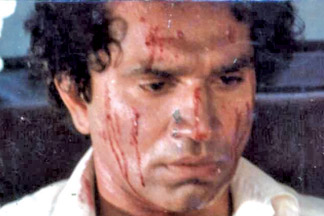 |
|
Dadayama |
There is a sinister move under this. I personally feel that the
attempt is to move step by step and discourage all the people from
investing in the local film industry. Then the gates will be open for
them to import and screen any film they want.
Q: What is the best acting lesson you can give a debutant?
A: American actor Spencer Tracy said that ‘learn your lines’
is the best acting advice he can give a debutant. I think it has a huge
significance. It does not merely mean not reciting the dialogues right.
You need to understand the character, realize what you are doing and
what is demanded of you for this particular character that you are
portraying.
The younger generation is talented but they do not make use of their
talents may be due to their present day lifestyle. Many directors expect
the actors to come in, recite the lines and leave the scene. Such things
have created a false impression that acting can be done like that. I too
would like to repeat Tracy’s advice. Acting is serious business. Apply
yourself. No one else will benefit from it other than the person who
does it.
Q: What has been your most memorable film moment?
A: It was the day that Dr Lester James Peries said that he
would like me to play one of the three important characters in Desa
Nisa. To be selected for a Lester James Peries movie, even before your
career had been screened, was a magnificent breakthrough. Joe
Abeywickrama had seen my potential and he had told Dr Peries about me.
It was a turning point in my career.
Q: Forty two years in the industry, what has remained
unchanged about you?
A: I am the same person who entered the industry in 1971 and
who joined Lionel Wendt in 1969. The people who knew me at that time
know that I am the same Bonnie they knew who first came to films.
I go about my daily life just like other human beings when I am away
from the camera. Of course certain things like the way people react to
you because you are a well known figure bring a difference.
The society is helpful whenever you are in difficulty.
I like solitude a lot, but it is very difficult to go to a hotel for
a holiday because everybody will want to spend time with you which
becomes another public life again. I do not complain about it, but I
have a hideout in Anuradhapura where I go to enjoy the beauty of the
environment.
Q: Most of your contemporaries have moved onto directing or
producing. Do you find this choice lucrative as, say, being in front of
the camera? Would you dabble with directing in the near future?
A: I have been in front of the camera not because it is
lucrative. It is the least paid job and even an artiste who had been in
the top rung for so long can earn a little. What keeps me in front of
the camera is my passion for acting. I appreciate the opportunity to
become a Supreme Court judge in the morning and a street sweeping coolie
in the evening. I have always had the notion that directing a film is
such a big responsibility. You have to become a master to become a film
director. I am always thinking that I am not good enough to venture into
that sector. I know the mechanics behind production and I could have
earned more because I know what kinds of films should be made to have
audience’s acceptance and I would have enough support from the industry
if I were to do a film but I haven’t gone into it. I felt that I would
not enjoy my acting the way I do now had I turned director or producer.
There is no definite explanation to this question though I was very
keen to learn about the technical aspects of film-making from the start
of my career.
Q: A book on Ravindra Randeniya. Is it a distant possibility?
A: Many knowledgeable people have insisted that I am not being
fair by the country and the industry by putting out my memoir. Everybody
has been asking me why there should not be a felicitation for me after
more than 40 years of service. I just can’t address my mind to that kind
of thing though I have been very involved in organizing that kind of
events for other artistes.
|



